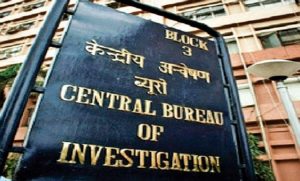
*Union Minister Shri Ashwini Vaishnaw Stresses Need for Techno-Legal Framework to Address Emerging New-Age Crimes and to Ensure Prompt Investigation and Bringing Criminals to Justice for Effective Prosecution*
*Technical knowhow of India’s academia, scientists and researchers should be harnessed to bring about technological solutions in investigations*
*Union Minister Urges CBI to Establish State-of-the-Art Cyber Forensic Labs in Collaboration with Academia*
*Amid Deepfake & AI challenges, Ashwini Vaishnaw says the Future of Effective Criminal Justice lies in combining legal frameworks with Technological Capability and Institutional innovation*
*Shri Ashwini Vaishnaw delivers 21st D.P. Kohli Memorial Lecture on CBI’s 62nd Foundation Day, presents police medals to 26 officers*
*Union Minister highlights CBI’s role in justice and outlines four key pillars of India’s growth strategy*
Shri Ashwini Vaishnaw, Minister of Railways, Information & Broadcasting, and Electronics & IT, addressed the 21st D.P. Kohli Memorial Lecture on CBI’s 62nd Foundation Day held today at Bharat Mandapam, New Delhi.
Speaking on the theme ‘VIKSIT BHARAT @ 2047 - A Roadmap for CBI’, the Minister outlined a strategic vision for the agency’s role in India’s progress over the next two decades.
During the event, President’s Police Medals (PPM) for Distinguished Service and Police Medals (PM) for Meritorious Service to CBI officers were presentedacknowledging their dedication and exceptional contributions.
Union Minister urged the CBI to take the lead in building state-of-the-art cyber forensic laboratories by actively partnering with academic and research institutions. He further highlighted the need for institutional frameworks that facilitate such collaborations and suggested that Ministries and Departments such as MeitY, Department of Telecommunications (DoT), and Department of Science and Technology (DST) work closely with investigative agencies to co-create technologies required for modern-day law enforcement.
The Minister’s remarks come in the backdrop of rapid technological evolution, including challenges posed by artificial intelligence, deepfakes, and cyber-enabled crimes. He stressed that the future of effective criminal justice lies in combining legal frameworks with technological capability and institutional innovation.
Reflecting on India’s transformative journey over the past decade, the Minister noted the country's rapid economic growth, strong governance, and technological leadership.
He further highlighted four pillars of growth strategy in the last decade, first, public investment in physical, social and digital infrastructure, second a large number of inclusive growth programs, third a strong focus on manufacturing and innovation and fourth, simplification of legal and compliance structures.
*First Pillar: Public Investment InPhysical, Social and Digital infrastructure*
The first pillar of India’s growth strategy focuses on significant investments in social, physical and digital infrastructure, including the construction of national highways, new airports, and the electrification of railways.
The Minister said that under the leadership of Prime Minister Shri Narendra Modi, India has democratized technology with over 118 crore telecom subscribers, 70 crore smartphone users, and a robust AI ecosystem to support innovation. In social infrastructure, India has also expanded educational opportunities by opening 490 new universities and increasing the capacity of IITs, IIMs, and AIIMS.
*Second Pillar: Inclusive Growth*
The second pillar of India’s growth strategy focuses on inclusive growth, ensuring that economic progress translates into real improvements in people's lives. Over the past decade, 54 crore new bank accounts have been opened, 4 crore houses built, and 12 crore tap water connections provided. In addition, 35 crore citizens are part of the Ayushman Bharat program, with more than 25 crore citizens coming out of poverty and improved access to essential services for millions.
*Third Pillar: Strong Focus on Manufacturing and Innovation*
The third pillar of India’s growth strategy emphasizes manufacturing and innovation, shifting the country from a services-based economy to a manufacturing hub. Initiatives like Make in India and Startup India have spurred growth, with electronics becoming the third-largest export and India becoming the second-largest mobile manufacturer globally.
Key successes include developments in the semiconductor, defense, telecom sector, and the launch of high-speed Vande Bharat trains.
*Fourth Pillar: Simplification of legal and compliance structures*
The fourth pillar of India’s growth strategy focuses on simplification by eliminating outdated colonial-era laws. Over 1,500 archaic laws have been removed, and new frameworks like the Bharatiya Nyaya Sanhita (BNS) and Bharatiya Nagarik Suraksha Sanhita (BNSS) have replaced old legal structures such as the IPC and CrPC. This simplification process is paving the way for a more modern and efficient legal system.
CBI Director, Shri Praveen Sood welcomed the guests on the occasion. Attorney General of India, Central Vigilance Commissioner, Director IB, Director ED, Heads of NIA & Central Paramilitary Forces graced the occasion. Police Liaison Officers (PLOs) of other countries, also attended the event.